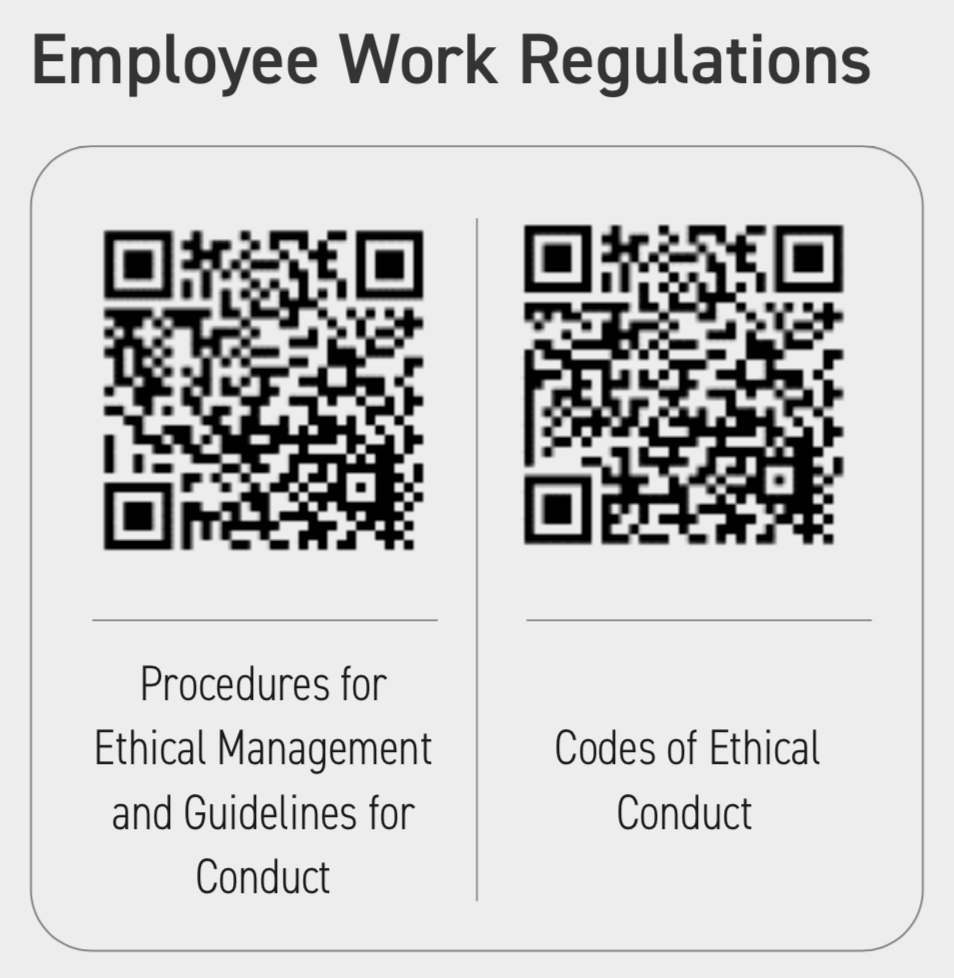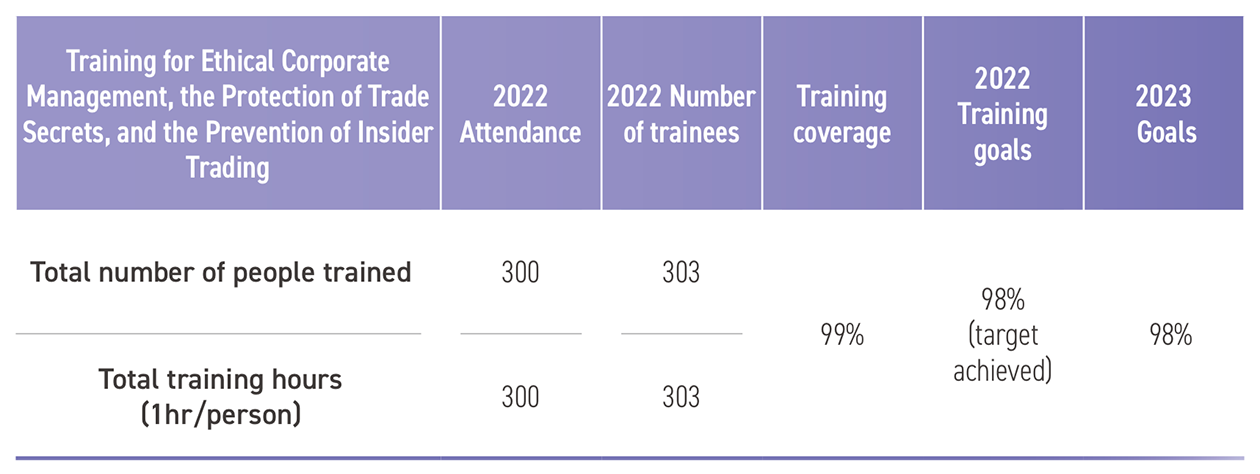Home / ESG / Ethical Management
Ethical Management and Anti-corruption Regulations
Ethical Management Regulations and Responsible Unit
Ethical management is the root of corporate management, hence RichWave conducts business activities based on the principle of fairness, honesty, integrity, and transparency. The Board of Directors has approved the “Procedures for Ethical Management and Guidelines for Conduct” that applies to the group’s parent company and subsidiaries. The guideline outlines the precautions RichWave employees should observe while implementing services, so as to materialize the company’s ethical management policy, vigorously prevent unethical conduct, and prevent the company employees from, in the course of their duties, directly or indirectly providing, accepting, promising or requesting improper benefits, or committing a breach of ethics, unlawful act, or breach of fiduciary duty to acquire or maintain benefits. The guideline stipulates that the company’s colleagues should avoid unethical conduct including corruption, bribery, political donation, conflict of interest, and anti-competitive practices. The guideline also states the possible disciplinary actions against unethical conduct and proposes a clear reporting procedure.
The President’s Office of RichWave is responsible for promoting and implementing ethical management, and it must report to the Board of Directors regularly (at least once a year). It is also obligated to report to the Board of Directors at any time about the following:
- Help to incorporate ethical and moral values into the corporate management strategy, as well as cooperate with the law to formulate ethical management-related fraud prevention measures.
- Regularly analyze and evaluate the risks of unethical conduct within the business scope to formulate solutions to prevent unethical conduct, as well as to define work-related SOPs and guidelines within various solutions.
- Plan the internal organization, structure, and allocation of responsibilities and set up check-and-balance mechanisms for mutual supervision of the business activities within the business scope which are possibly at a higher risk for unethical conduct.
- Promote and coordinate awareness and educational activities concerning ethics policy.
- Develop a whistleblowing system and ensure its operating effectiveness.
- Assist the Board of Directors and management in auditing and assessing whether the prevention measures taken to implement ethical management are operating effectively, and prepare reports on the regular assessment of compliance with ethical management in operating procedures.
- Prepare and maintain the ethical management policy as well as the compliance statement and documented information such as the materialization of commitments and implementation status.
The ethical management promotion status was reported to the Board of Directors on 12/22, 2022, and received the board’s approval.
The company must review the risk of potential unethical conduct at all times based on the principle of “Procedures for Ethical Management and Guidelines for Conduct” and bolster education and promotion. The company has established and announced an internal independent whistleblowing email and hotline on the company’s website and intranet or commissioned other external independent organizations to provide a whistleblowing email and hotline for the company’s internal and external person. To encourage internal and external personnel to report unethical conduct or misconduct, a reward of less than NT$500,000 will be provided depending on the severity of the offense to increase the company’s ethical management performance and foster an ethical culture with our colleagues in the company. In 2022, the company had no cases of integrity violations and no cases of reported integrity violations.

Codes of Ethical Conduct
RichWave believes that ethical conduct should begin at the top, leading by example to guide the company’s colleagues, thus the “Codes of Ethical Conduct” has been stipulated, describing the eight good conducts expected of the company’s directors and managers in regard to ethical standards including the prevention of conflict of interest and the pursuit of personal gains, confidentiality responsibility, fair transactions, protection and the appropriate use of the company’s properties, legal compliance, encouraging the reporting of any illegal or unethical conducts, as well as disciplinary measures. The guideline defines the conflict of interest that occurs involving personal interests or the company’s overall interests, stipulates conflict of interest prevention policies, and provides adequate channels for the directors or managers to voluntarily explain whether a potential conflict of interest with the company exists; when the company is given an opportunity to gain profits, the directors and managers are reminded of their duties to increase the company’s legitimate profits; it also stipulates that the directors or managers are bound by the duty of confidentiality for information pertaining to the company, suppliers or customers, unless otherwise authorized or disclosure is required by the law; The directors or managers should treat the company’s suppliers, customers, competitors, and employees fairly. The company is now allowed to manipulate, conceal, and misuse the information they received at work, and it is not permitted to obtain improper profits through false statements or other unfair transactions; it regulates that the directors or managers have the responsibility to safeguard the company assets and to ensure that they can be effectively and lawfully used for official business purposes; The company should reinforce the internal promotion of ethical awareness and encourage employees to report suspected or confirmed violations of law or unethical conduct to the managers, internal audit supervisors, or other appropriate staff. The company has stipulated a clear whistleblowing system that allows for anonymous whistleblowing; when the directors or managers violate the codes of ethical conduct, the company should deal with the problem per the disciplinary measures in place and immediately publish information such as the date of violation, reasons for violation, the code violated, and the actions adopted to remedy the situation on the MOPS. Through the regulatory document, we can forge an ethical consensus among our directors and managers, as well as allow the company’s stakeholders to further understand the company’s ethics regulations.
The company incorporates the codes of conduct for its employees into the standard employment contracts. All employees are required to sign and adhere to the code of conduct. The content of the code encompasses principles of ethics, equal employment, and ethical conduct, the prohibition of harassment and violence, respect for privacy, respect for the intellectual property rights of others, the prevention of conflicts of interest, fair dealings, and the prevention of anti-corruption and bribery. The code also explicitly states the disciplinary measures that will be taken in the event of violations. The policy ensures that all employees possess a comprehensive understanding of and adhere to the ethical standards and moral principles of the company.

Training for Ethical Corporate Management, the Protection of Trade Secrets, and the Prevention of Insider Trading
The company stipulates that the responsible unit should conduct at least one internal promotion of ethical management every year, where the Chairman, President, or senior management communicate the importance of ethics to the directors, management, and company colleagues. To ensure that employees are well-informed about the company's regulations and to maintain a fair competitive environment, the company conducts orientation lectures for new employees. The lectures provide comprehensive explanations of the Codes of Ethical Conduct. Furthermore, the company arranges an annual training program that specifically emphasizes the safeguarding of trade secrets and the prohibition of insider trading. The program emphasizes the importance of ethical behavior and compliance with relevant laws and regulations. The company extends invitations to external lawyers who are assigned the responsibility of delivering lectures to the managers and employees. The lectures aim to provide a comprehensive understanding of trade secrets and insider trading, thereby enhancing participants' knowledge in this area. By engaging in the analysis of practical case studies and participating in discussions, employees are able to acquire a heightened understanding of the potential adverse consequences on both themselves and the company. Furthermore, individuals gain awareness of the civil and criminal liabilities associated with violations in this specific domain. The company has scheduled its annual training on ethics, trade secret protection, and prevention of insider trading for December 27, 2022. The training had a total of 300 participants and lasted for a duration of 300 hours. With the exception of three employees who were on assignment abroad, all the remaining employees attended the training session, resulting in a training coverage rate of 99% and successfully meeting the company's annual training objective.




